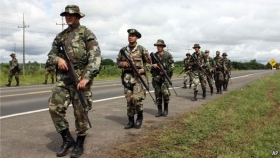Organized crime is severely restricting the ability of journalists to operate in Paraguay, according to a report published by campaign group Reporters Without Borders.
Situated at the heart of South America, Paraguay is a major hub for organized crime. The country has long been regarded as a haven for smugglers, and this was cemented under General Stroessner’s military dictatorship (1954-1989), when control of lucrative contraband business was used to reward regime supporters. In the last two decaes, the smuggling of otherwise legal products has been eclipsed by the trafficking of banned goods; Paraguay is now the continent’s largest producer of marijuana and an important transit route for cocaine and illegal arms.
The criminal groups operating in Paraguayan territory are diverse, ranging from foreign mafias, particularly Brazilian cartels like the First Capital Command (Primer Comando Capital – PCC), to the small Paraguayan People’s Army (EPP), which claims ideological motivations for its actions.
The report by Reporters Without Borders (RSF, for its initials in Spanish) documents the challenges faced by investigative journalism in the country. Journalists have limited capacity to cover organized criminal activity and, when they do so, often encounter bribes or threats of reprisals. Some admitted to a considerable degree of self-censorship.
Sources who spoke to RSF also detailed harrassment that they suspect was carried out by politicians or individuals linked to state-owned companies. In one case a radio station was allegedly pressured by the threat that state advertising would be withdrawn.
The report concludes that the direction press freedom in Paraguay will follow remains unclear. It’s possible that competition between organized crime gangs will lead to increasing violence and disorder, a process it calls “Mexicanization.” Certainly, there are parallels to be drawn with organized crime elsewhere in Latin America. Part of the difficulty in combating illegal armed groups in Paraguay stems from the terrain, much like rural departments of Colombia, where criminal groups can flourish due to the difficulty of policing. Any meaningful pursuit of organized criminals in Paraguay is complicated by a near total lack of basic infrastructure across vast swathes of scarcely populated countryside stretching north from Asuncion, where contraband arrives and departs by light aircraft and the only roads are dirt tracks. Lawless lands and porous borders are policed by authorities that are at best deficient and at worst complicit. Impunity is commonplace.
Indeed, the greatest obstacle to tackling organized crime in Paraguay, and mitigating its effects on press freedom, is the country’s weak institutional framework. Anecdotal evidence in the RSF report suggests that the move to a more open, multi-polar democracy with the Lugo government has improved efforts against crime, but only to a minor extent.
According to the World Economic Forum (WEF), Paraguay’s institutions rank 137th out of 139 countries (unchanged since 2007), a ranking based on measures including judicial efficiency, reliability of police services and incidence of bribery. In Transparency International’s corruption index Paraguay actually fared worse, losing ground since the end of six decades of single-party rule in 2008.
Although power has been handed over, drawing a line under the dominance of the long-ruling Colorado Party, ending impunity in Paraguay would require a major overhaul of the judicial system and security forces, as RSF urges.

